
Table of Contents
In today’s competitive employment market, having a good educational background is critical for standing out. The Project Management Professional (PMP) credential and a Master of Business Administration (MBA) degree are two prominent possibilities, as both have distinct advantages and can help you advance in your profession, but which is best for you? We’ll compare and contrast the PMP and MBA to assist you in deciding which path to take.
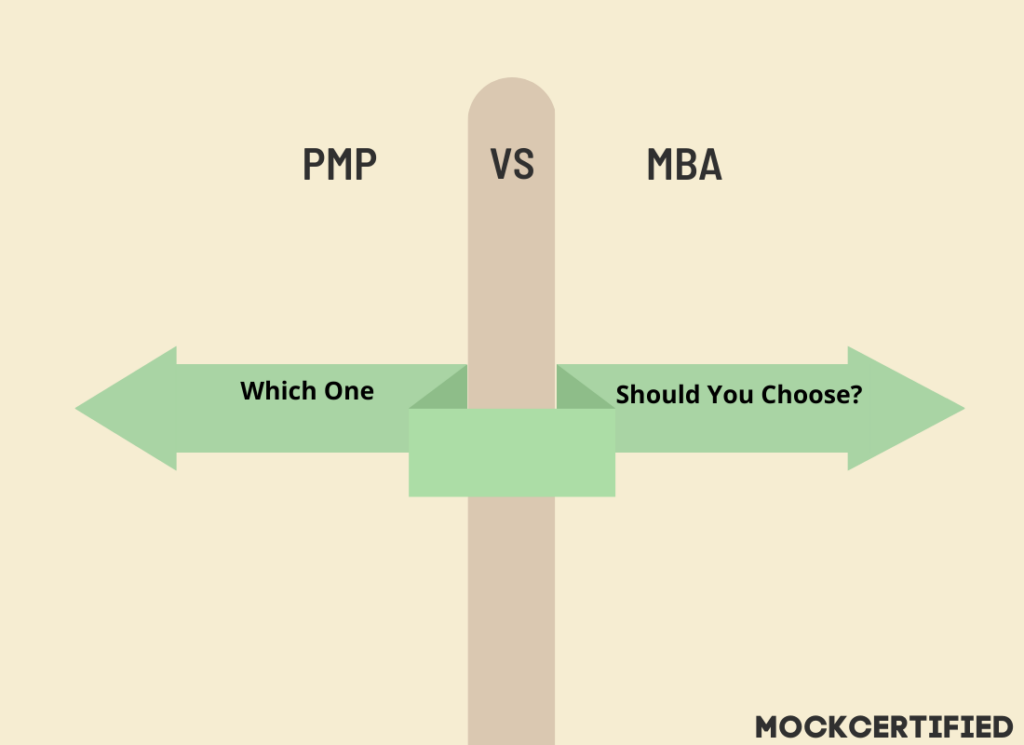
What is a PMP certification?
Project Management Professional (PMP) certification, which is a worldwide recognised credential is intended for those who want to demonstrate their project management competence and is based on the Project Management Institute’s Guide to the Project Management Body of Knowledge (PMBOK). The PMP certification requires completing a difficult exam that assesses project management knowledge, abilities, and experience.
What is an MBA degree?
A Master of Business Administration (MBA) is an internationally recognised graduate-level degree which is mostly concerned with management, marketing, finance, and accounting. MBA degrees can be completed on-campus or online and typically takes at least two years. It benefits then students by improving their critical thinking, problem-solving, and leadership abilities while also providing a thorough grasp of management concepts and practises.
What’s the difference?
The main difference between the PMP certification and MBA degree is their focus. The PMP certification is primarily focused on project management, while an MBA degree covers various aspects of business.
The PMP certification is also more specific, while an MBA provides a broad understanding of business concepts and practices. Another difference is the way they are obtained. The PMP certification requires passing a single exam, while an MBA degree requires completing a program of study.
PMP vs MBA: Which one is more suitable for project management?
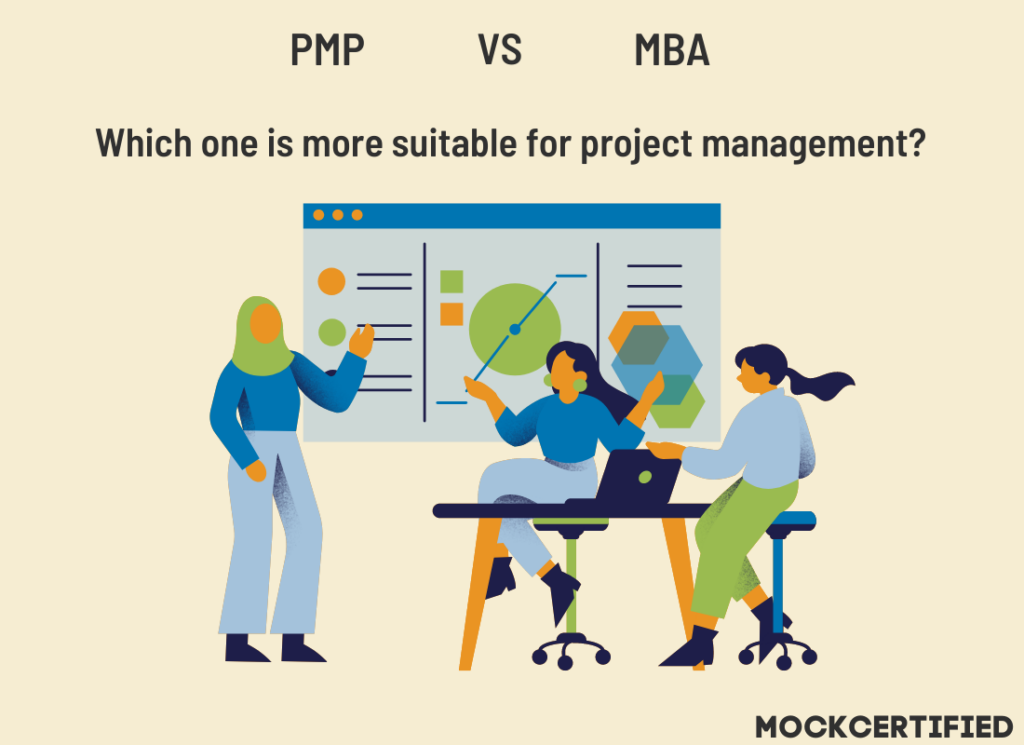
If you want to focus solely on project management, then the PMP certification is more suitable. The PMP certification covers all aspects of project management, including project initiation, planning, execution, monitoring and controlling, and closing. It also tests knowledge, skills, and experience in project management and requires continuous education to maintain the certification.
PMP vs MBA: Which one is more suitable for business management?
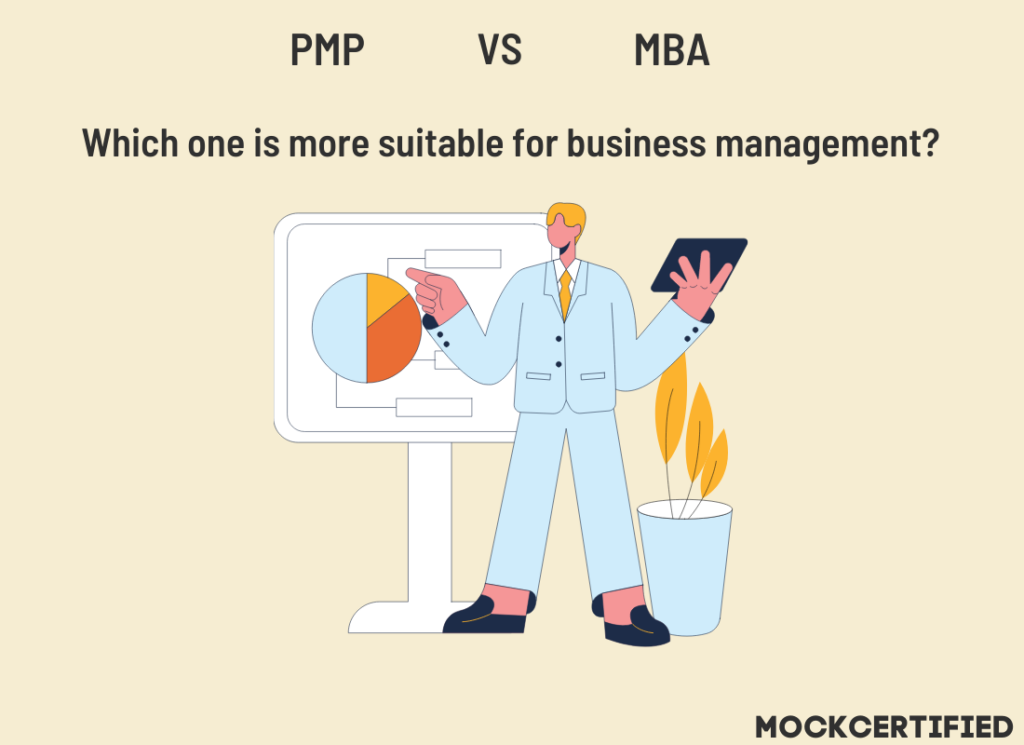
If you want to gain a broad understanding of business concepts and practices, then an MBA degree is more suitable. MBA programs cover various aspects of business, including management, marketing, finance, and accounting. Hence, can also lead to a wide range of career opportunities in different industries.
PMP vs MBA: Which one has a higher earning potential?
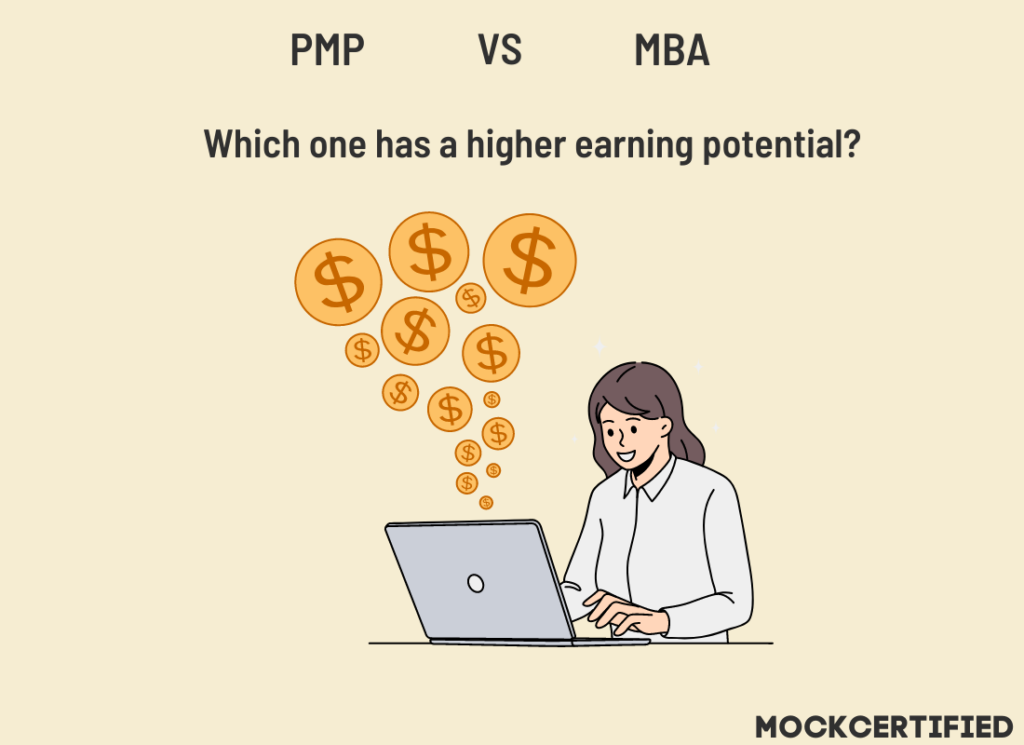
The PMP and the MBA both have the potential to increase wages. According to surveys, MBA graduates are paid more than PMP-certified specialists. According to PayScale, the average salary for PMP-certified is $91,000 and for MBA graduates in the United States is $88,000. Please note that this varies according on the industry, area, and amount of experience.
PMP vs MBA: Which one is more recognised globally?
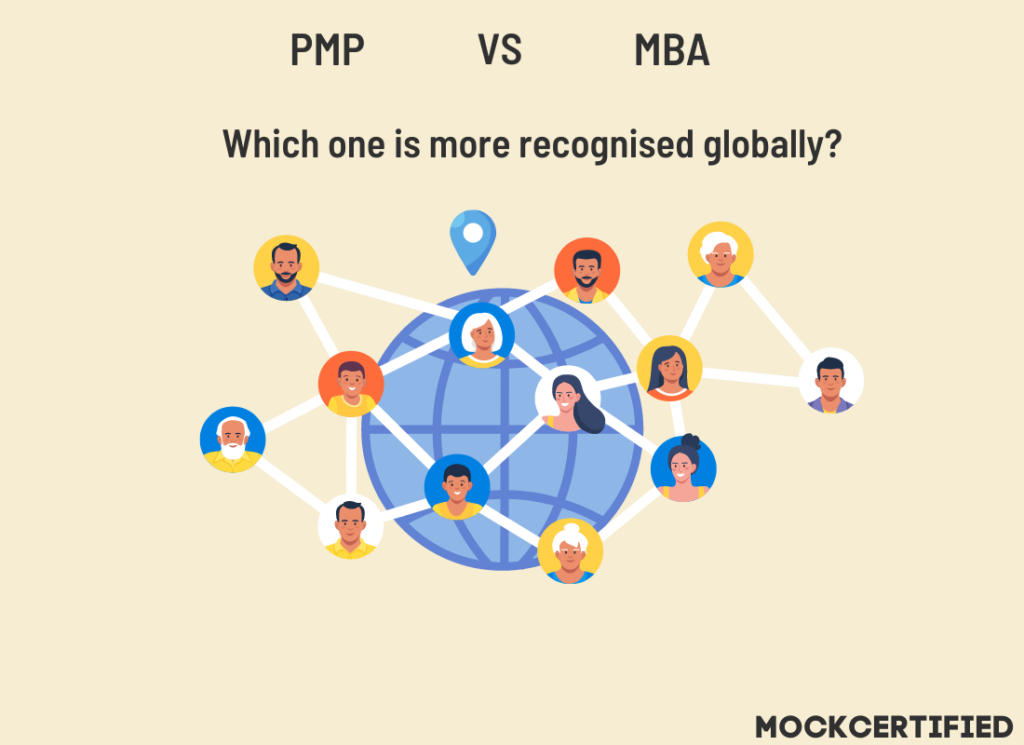
Both the PMP certification and the MBA degree are widely respected. The PMP certification, on the other hand, is more specific to project management and is respected across sectors. MBA, on the other hand, is much more recognised in the corporate world and may lead to job prospects in a variety of industries and locations.
PMP vs MBA: Which one is more time and cost-effective?
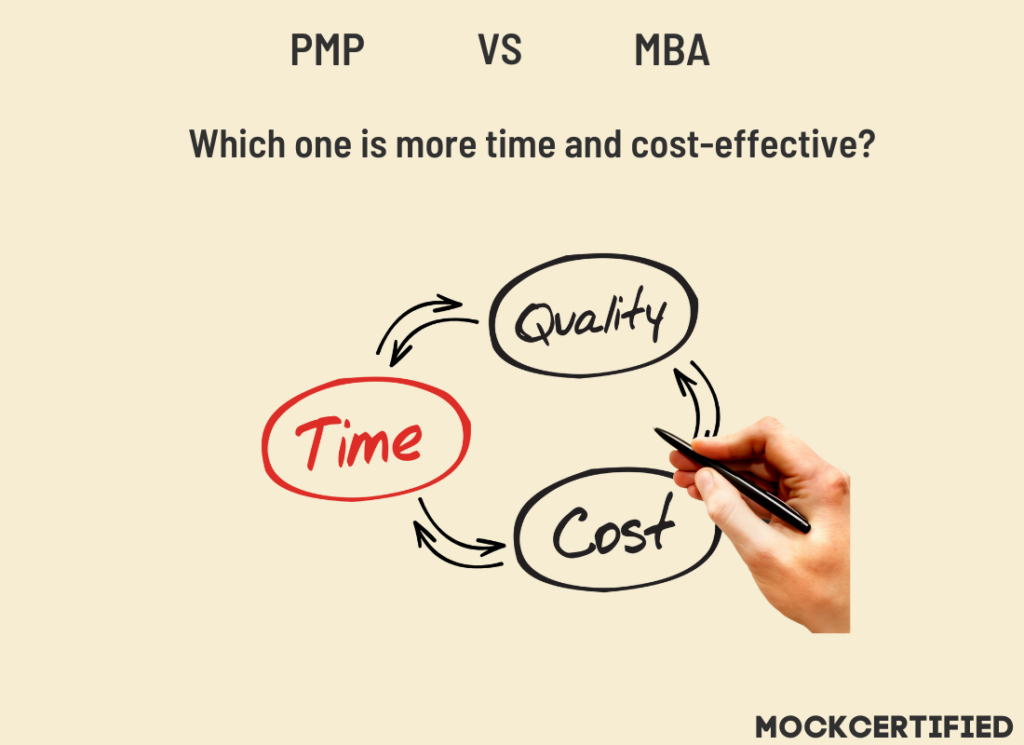
The PMP certification is generally more time and cost-effective than an MBA degree. The PMP certification exam can be completed in a few months, and the cost is significantly lower than an MBA program. Whereas, An MBA degree, can typically take at least two years to complete and can cost tens of thousands of dollars solely in tuition fees.
PMP vs MBA: Which one is more flexible?
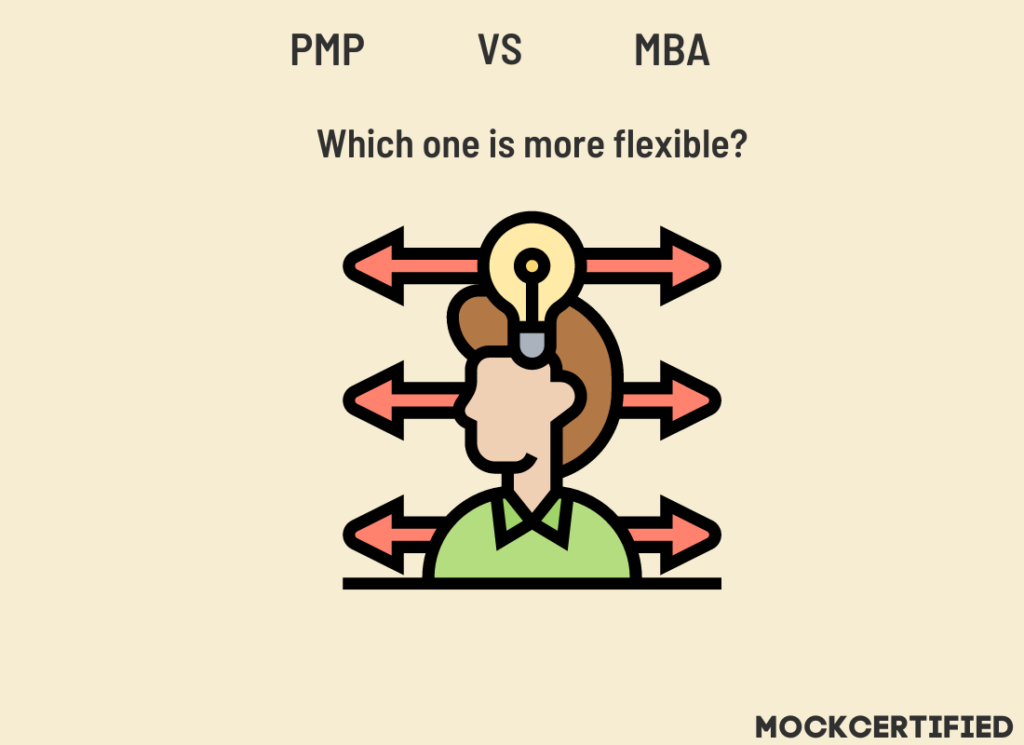
Both the PMP certification and MBA degree can be completed on-campus or online, providing flexibility for students who are working or have other commitments. However, the PMP certification is more flexible than an MBA degree since it only requires passing a single exam, and continuous education can be completed online.
PMP vs MBA: Which one is more suitable for career advancement?

Both the PMP certification and the MBA degree can lead to prospects for growth in one’s profession. The PMP certification, on the other hand, is more suited to professionals who want to improve their careers in project management, whilst an MBA degree is better suited to individuals who want to obtain a wide grasp of business principles and practises.
PMP vs MBA: Which one is more suitable for entrepreneurship?

An MBA degree is more appropriate if you wish to start your own firm. By giving a full grasp of business ideas and practices, an MBA degree can assist you in acquiring the skills and information required to develop and maintain a successful organisation. The PMP certification, on the other hand, is largely focused on project management and may not provide the necessary skills and knowledge for entrepreneurship.
PMP vs MBA: Which one is better for networking opportunities?
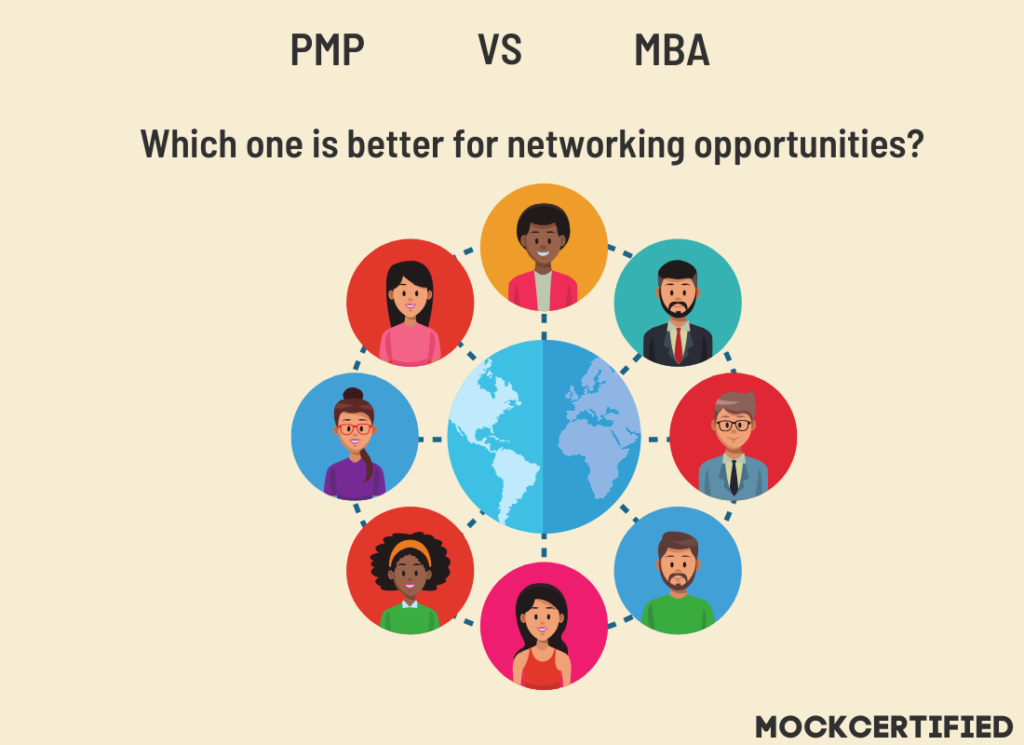
Both the PMP certification and MBA degree can provide networking opportunities. However, an MBA degree is more suitable for professionals who want to expand their networks in the business world and can lead to opportunities to meet other professionals in various industries and countries.
PMP vs MBA: Which one has better job prospects?
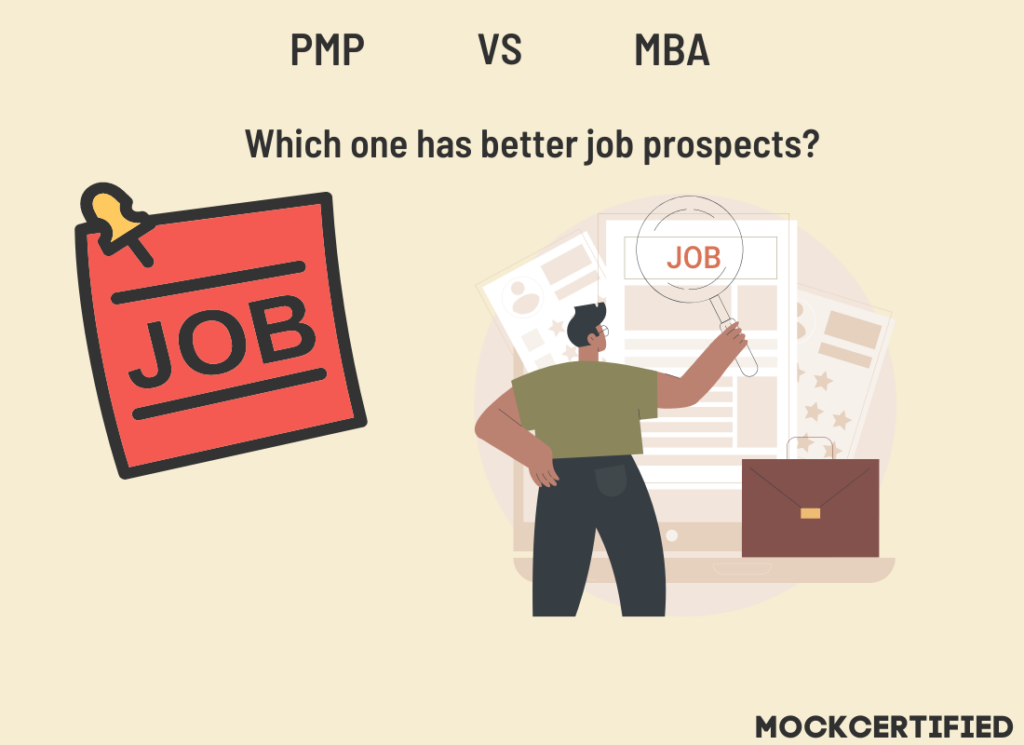
Both the PMP certification and MBA degree can lead to excellent job prospects. However, the job market for PMP-certified professionals is more specific to project management, while an MBA degree can lead to a wide range of career opportunities in different industries.
PMP vs MBA: Which one should you choose?
Your job ambitions and aspirations will determine whether you pursue a PMP certification or an MBA degree. If you wish to concentrate completely on project management, the PMP certification is more appropriate. An MBA degree is better appropriate if you wish to get a deep grasp of business principles and practises. Both alternatives can improve your professional chances and raise your earning potential, so examine the benefits and disadvantages and select the path that best fits your objectives.
If you’re ready to embark on the PMP journey, seize the opportunity to test your skills here!
Pros and Cons: PMP
Pros of PMP
- Industry Recognition: Widely recognized and respected in project management field.
- Career Opportunities: Opens doors to higher-paying job roles and career advancement.
- Global Applicability: Recognized globally, enhancing international job prospects.
- Skill Validation: Validates your project management skills and knowledge.
- Structured Approach: Equips you with structured methodologies for effective project execution.
- Network Building: Connects you with a community of professionals and experts.
- Problem-Solving: Enhances problem-solving and decision-making abilities.
- Employer Demand: Many employers seek PMP-certified professionals for project leadership roles.
- Project Success: Increases likelihood of successful project outcomes.
- Personal Growth: Boosts confidence and competence as a project manager.
Cons of PMP
- Time and Effort: Requires dedicated time and effort for exam preparation.
- Cost: Exam fees, study materials, and training can be expensive.
- Experience Requirement: Requires substantial project management experience to be eligible.
- Renewal and PDUs: Requires ongoing renewal through earning Professional Development Units (PDUs).
- Rigorous Exam: PMP exam is known for its difficulty and complexity.
- Niche Focus: Primarily focused on project management, may not suit all career paths.
- Evolution: PMP content evolves with industry changes, requiring continuous learning.
- Not for Beginners: May be challenging for those new to project management.
- Maintenance Effort: Maintaining the certification requires ongoing commitment.
- Market Saturation: Increasing number of PMP-certified professionals may lead to market saturation in some regions.
Pros and Cons: MBA
Pros of MBA
- Career Advancement: Opens doors to higher-level management positions.
- Salary Increase: Often leads to higher earning potential in the long term.
- Skill Diversification: Develops a broad range of business skills and knowledge.
- Networking: Provides opportunities to build a strong professional network.
- Industry Connections: Connects you with alumni and industry experts.
- Global Opportunities: Can enhance international job prospects and mobility.
- Entrepreneurial Skills: Equips you with skills to start and manage your own business.
- Business Insight: Provides deeper understanding of business operations and strategy.
- Credibility: Enhances credibility and reputation in the business world.
- Problem-Solving: Improves critical thinking and problem-solving abilities.
Cons of MBA
- Cost: Can be expensive, with tuition, books, and other expenses.
- Time Commitment: Full-time programs take two years, impacting work-life balance.
- Opportunity Cost: Time spent on an MBA could have been used for work experience.
- Market Saturation: Increasing number of MBA graduates may lead to competition.
- Specialization: General MBA may lack focus in specialized fields.
- Work Experience Requirement: Some programs require work experience for admission.
- Curriculum Relevance: Some argue that MBA curricula don’t always reflect current business realities.
- Debt Accumulation: Loans to cover tuition may result in significant debt.
- Not Always Required: In some industries, an MBA might not be necessary for career progression.
- Varied Outcomes: Outcomes and benefits can vary based on program quality and specialization.
Conclusion
In conclusion, the PMP certification and MBA degree are both good choices for individuals looking to advance their careers and raise their earning potential. Both offer distinct advantages and can lead to possibilities for growth in one’s career.
Choosing which is best for you is determined by your job objectives and aspirations, so assess the benefits and drawbacks carefully and select the path that best fits your needs.
If you’ve liked this article, you can read more here



